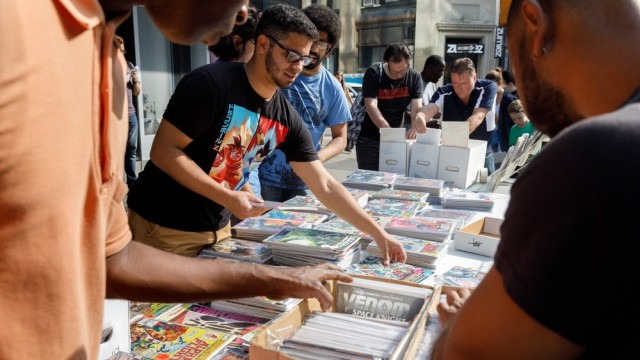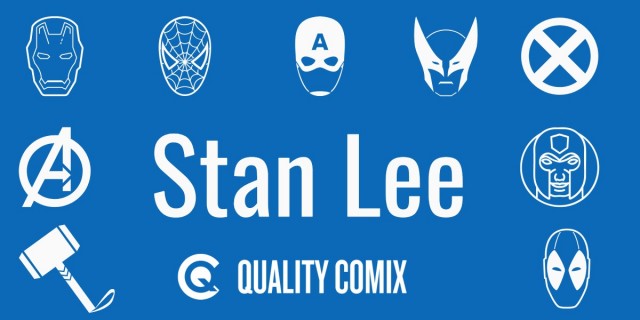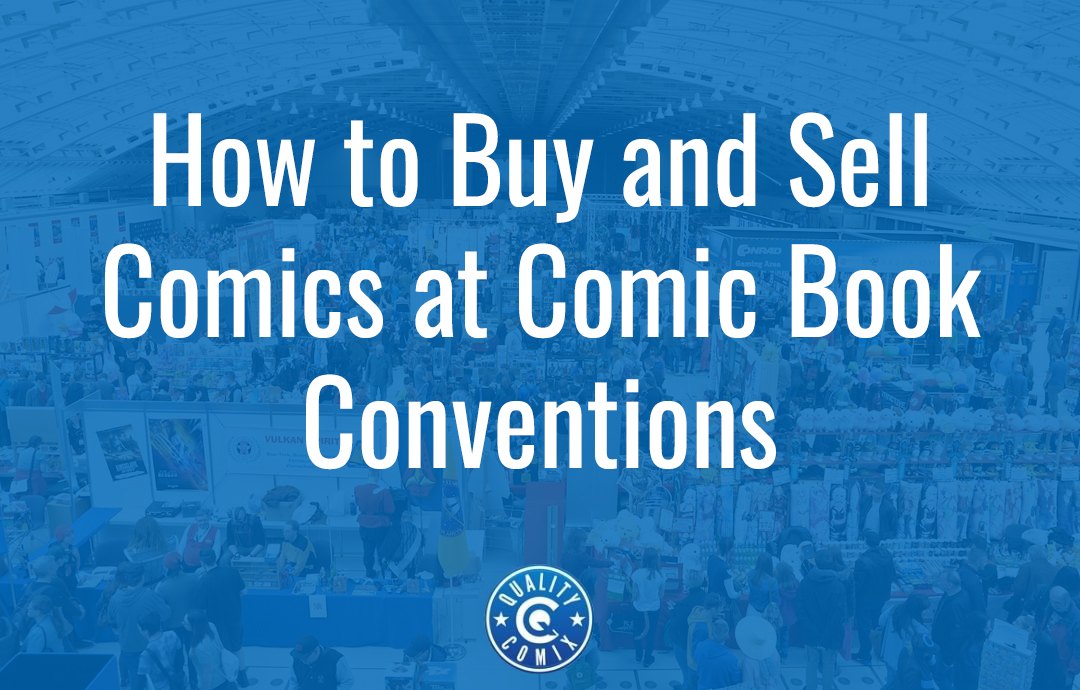
There are a ton of different ways you can buy and sell comics. You can make deals online via social media. You can buy and sell through auction sites like eBay or through marketplaces like Facebook or Craigslist. You can visit a local comic shop and buy from their inventory, sell to their buylist, or try to sell on consignment.
Another option available to some is to make deals at comic conventions. Comic conventions – from smaller local gatherings to the big names like San Diego Comic-Con – are huge gatherings of comic fans and enthusiasts, many of whom have their collections in mind when they're visiting. It's a perfect place to make a deal you might not otherwise be able to land while avoiding issues like shipping and handling or parcel insurance.
The only question is, how can you do it? Here's our guide to help you out. Note before we begin that this is all advice for buying and selling comics as a collector and casual vendor, not as a professional; if you're a comic shop owner, artist, or other professional, there are more specific tips (like these) that can be more helpful than the below advice. With that said, let's dig in.
Table of Contents
Buying, Selling, or Both?
If you're interested in buying or selling at a convention, the first choice you have to make is which one of those you're planning to do, or both.
Going to a convention with the plan to buy comics can be a great opportunity to find some great deals, build connections, and boost a collection. Before you go, though, you should have an idea in mind for your budget, as well as some goals for the comics you want to buy and the amount you're willing to pay for them. Otherwise, it's easy to accidentally spend way too much money on attractive comics or fall prey to charismatic vendors convincing you an overpriced issue is a better deal than it is.
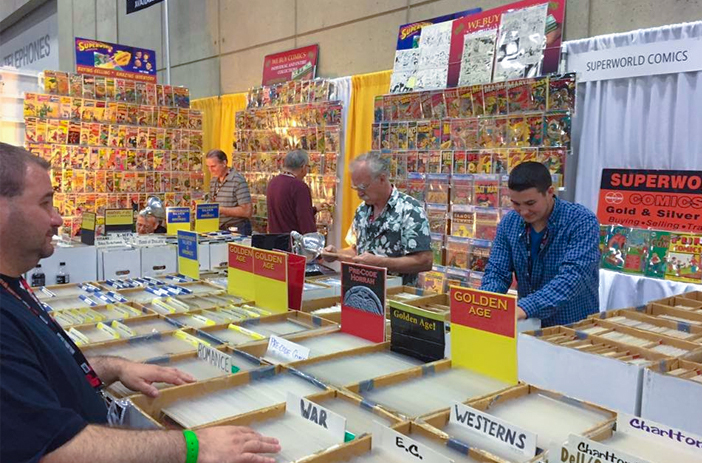
Image source: Google Images
If you're selling, on the other hand, you have two main options. You can bring your collection in and try to sell it to one of the many vendors who buy at a con, or you can set up a booth and become a vendor yourself. Both options can be good, and we'll have tips for both below.
Basically: go in with a goal, know what you intend to do, and try to stick with your plans.
Choosing a Convention
Once you've decided you want to buy or sell at a convention, you have another question to answer: which convention?
Every major city has a variety of smaller local conventions, and there are always the Big Names in comic cons, like SDCC, NYCC, Fan Expo, and PAX.
Going to a larger convention exposes you to the largest possible audience, but that's not always to your benefit. If you're selling, you'll have to do a lot more legwork to find vendors willing to buy and compare offers for a collection. If you want to buy a booth to set up, the larger conventions will be orders of magnitude more expensive than a smaller convention. Seriously, small conventions might be $100, whereas larger conventions can be $2,000 or more.

Image source: Google Images
Smaller conventions tend to be slower-paced and more intimate. You have a better chance of making a good deal when buying, but selling could very well be a bust if the audience doesn't really have people looking to buy what you're selling.
Our general recommendation is to try out smaller conventions first. You don't have to buy anything or sell a whole collection; you can just bring a few mid-value comics or a selection of midrange keys from your collection to set up a booth and give it a shot. Maybe setting up a booth isn't for you, and that's fine! Don't put all your eggs in one basket or be pressured to make bad deals just so the trip isn't a bust. A learning experience is still a valuable asset.
Selling to Vendors
Alright, let's start with the first scenario: you have a collection you want to sell. You decide to bring it to a convention and sell it to one of the vendors who have a booth set up advertising that they buy and sell.
Before you even go to the convention, you should evaluate your collection so you know what you have. Catalog your comics, noting which ones are keys, which ones are graded, and what their general condition is. Put prices on them and get an idea of the overall value of your collection. Pro tip: don't let someone go through and pick out the value from your collection; you might sell those comics for an exciting number, but the stuff left over will be much harder to sell.
A good first step is to scout out the whole convention hall to find all of the promising vendors. Unless you're at a very small convention, chances are there will be quite a few vendors around willing to make an offer on a collection. Make a list of those vendors.
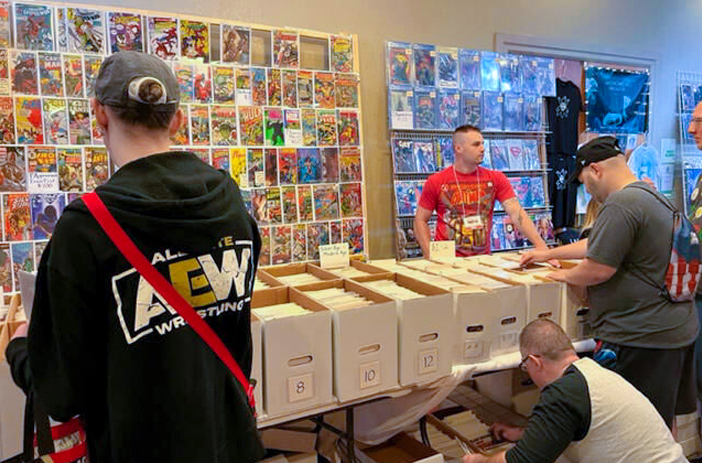
Image source: Google Images
Next, research them. You can do this in an out-of-the-way corner or lounge area on a phone easily enough. Just check through the various vendors and see what pops up on a Google search. Do they operate well-known stores? Are there "buyer beware" posts about them on Reddit? Scratch off anyone on the list who doesn't make the cut.
Next, go around to each of the vendors and pitch your collection. It can be very helpful to have a printout of the comics you're trying to sell, so a vendor can evaluate them at a glance. You certainly don't want to be lugging a collection through a convention hall! Leave them in your car, hotel, or other location; a trustworthy vendor will be more than happy to wait for you to get them to strike a deal.
Get quotes from various vendors, and don't be afraid to walk away. Another good reason to leave your collection behind is so you can't cave to pressure to sell for a take-it-or-leave-it "deal." Most comics vendors aren't going to try to pull those kinds of tricks, but you never know.
Finally, you can make the choice: are you going to sell, and if so, to who? Make the choice, fetch your comics, and go make the sale.
Getting a Booth
Now let's say you have a significantly larger collection you want to sell, possibly consisting of mostly high-value comics, and you want to set up something more official and sell to the crowd rather than just selling to whatever vendors you can find. That means getting a table or a booth set up.
This is a case where starting at a smaller convention and bringing just a relative handful of low- and mid-value comics can be the best option. While the vendor list is going to be more stable and generally trustworthy, the audience can have anyone in it, from the shadiest scammers to the shining paragons of the industry. You need to be confident of what you have, aware of pricing, and staunch in your self-confidence. It can be hard! That's why practice at a smaller convention is ideal.
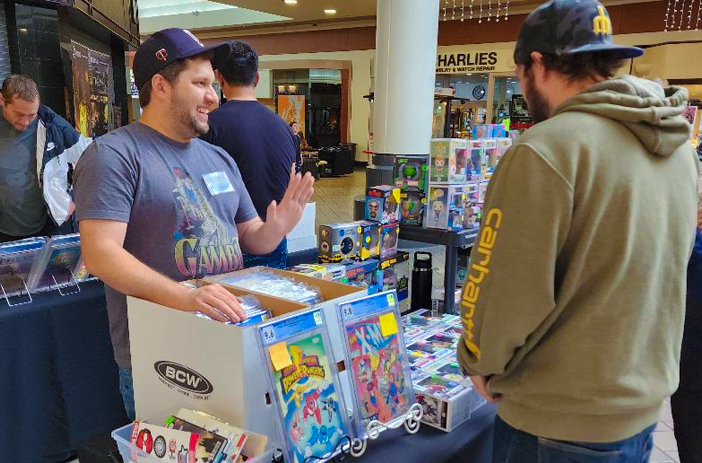
Image source: Google Images
As mentioned above, booths can cost anywhere from a few hundred to a few thousand, depending on the convention. You're starting in the hole, so you're going to want to price your comics to move. It might also be a great idea to have a friend or partner there with you in case you need to step away from the booth temporarily.
A lot goes into setting up a booth. Let's run down some of the key elements.
Shelf Appeal for Selling Comics
Shelf appeal is how attractive your booth looks. How well can you bring in interested buyers? A table covered in longboxes of haphazardly-sorted comics is attractive for some deal-hunters, but it's too much work for busy con-goers in a lot of cases. A table of well-laid-out, clearly-priced comics is a ton of work to set up and maintain, but easy for buyers to browse and purchase.
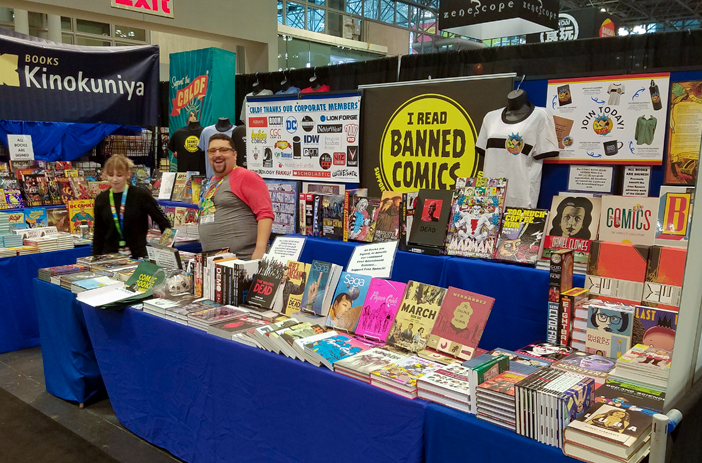
Image source: Google Images
If you're starting small at a smaller convention, a folding table and some signage might be all you need to display and sell a few hundred comics of varying price points. If you're ambitious, you could even create a small reference list of other comics you have for sale, though these days, an eBay link is usually most effective.
For more advanced sellers, display racks and a back wall for your most valuable comics and other merch can be a great option. There are tons of options for shelving and displays, and you'll want to make sure you're familiar with the convention's policies on stands and displays before setting one up. Some might not want a taller display or anything with lights and sounds, and so on.
Streamlining the Pricing Process
If you have hundreds (or even thousands) of comics you want to sell, it's going to be a long, tedious, and time-consuming process to price them all. You definitely don't want to keep all your prices in a book to reference or have to look up everything on eBay whenever someone is interested. You want clearly displayed prices so buyers can make offers and impulse purchases right away.
To streamline this process, a good idea is to break your comics down into categories and follow the 80/20 rule.
The 80/20 rule is that 80% of your value comes from 20% of your comics. So, identify the top 20% of your comics and individually price them.
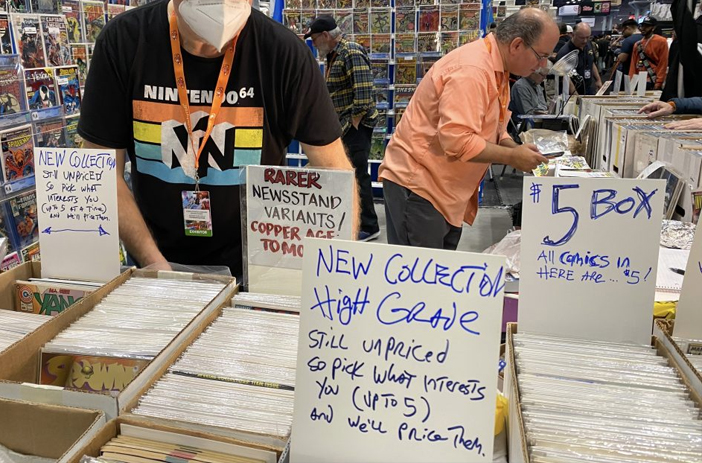
Image source: Google Images
For the rest, just put them in categories. A longbox of $1 comics, a longbox of $5 comics, a longbox of $10 comics; these can be great and attractive options for buyers. It's also great for you if you can sell some 50-cent comics for $1, some $3 comics for $5, or some $6 comics for $10. On the other hand, if you seed in some more valuable comics – put a few $3 comics in the $1 box – you might get people willing to comb through and buy a whole list of comics they want to get a "good deal" on, even if you know full well you're going to lose a little on them. Just having them browsing can attract more attention, after all.
You also have to decide if you're willing to negotiate and, if so, by how much. That's a decision you'll need to make on your own, and it comes down to whether you value the profit more than the sale.
Physical Security for Valuable Collections
Physical security can be very important, especially if you have high-value comics to sell.
One option is to keep all of your valuable comics on your person at all times. You're still at risk of pure theft, but you aren't risking having a car or hotel room broken into. Unfortunately, this can be very tricky, especially if you have a decent amount of valuable comics. Nobody wants to have to lug a suitcase around all day, right?
For securing valuable comics elsewhere, out of sight is best. People look for opportunity, and if they don't see it, they won't hunt for it.
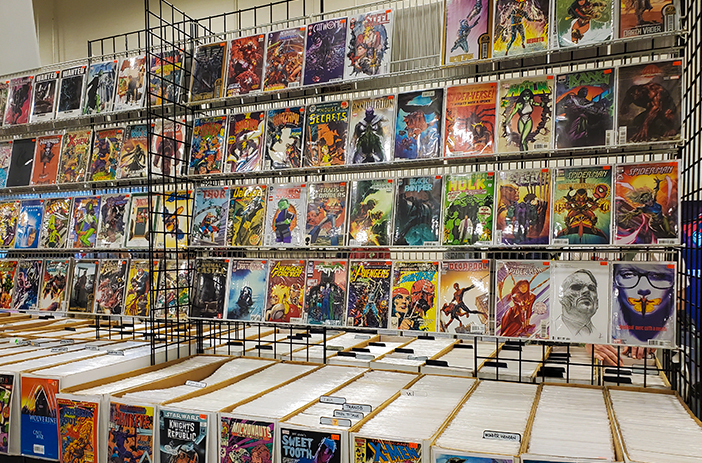
Image source: Google Images
At a booth, theft can be a real problem. Keeping your valuable comics behind you and in easy view is good for both display and security; no one can swipe a high-end comic off the table if it's not on the table in reach, after all.
Different conventions may also have different considerations, and multi-day conventions have other concerns.
Skip the Hassle
While comic conventions can be a ton of fun, they aren't always the best option for selling comics. If you have a collection you want to sell, one great option is to drop us a line. By filling out this form, you can show us your collection, and we can offer thoughts, opinions, and options.

Want an appraisal? Sure! Want to sell to us? Of course! Want to get an idea of what you should do with your collection with no pressure or obligations to sell? We're here for you.

